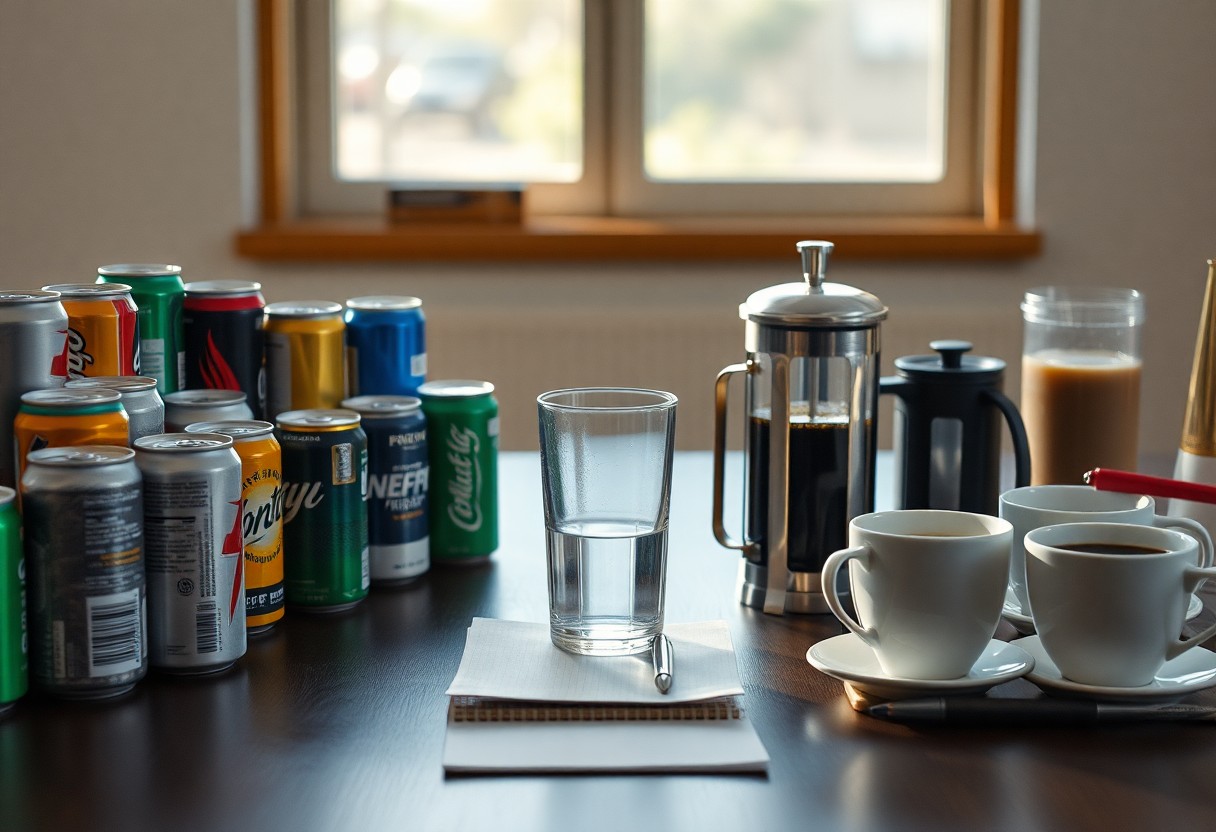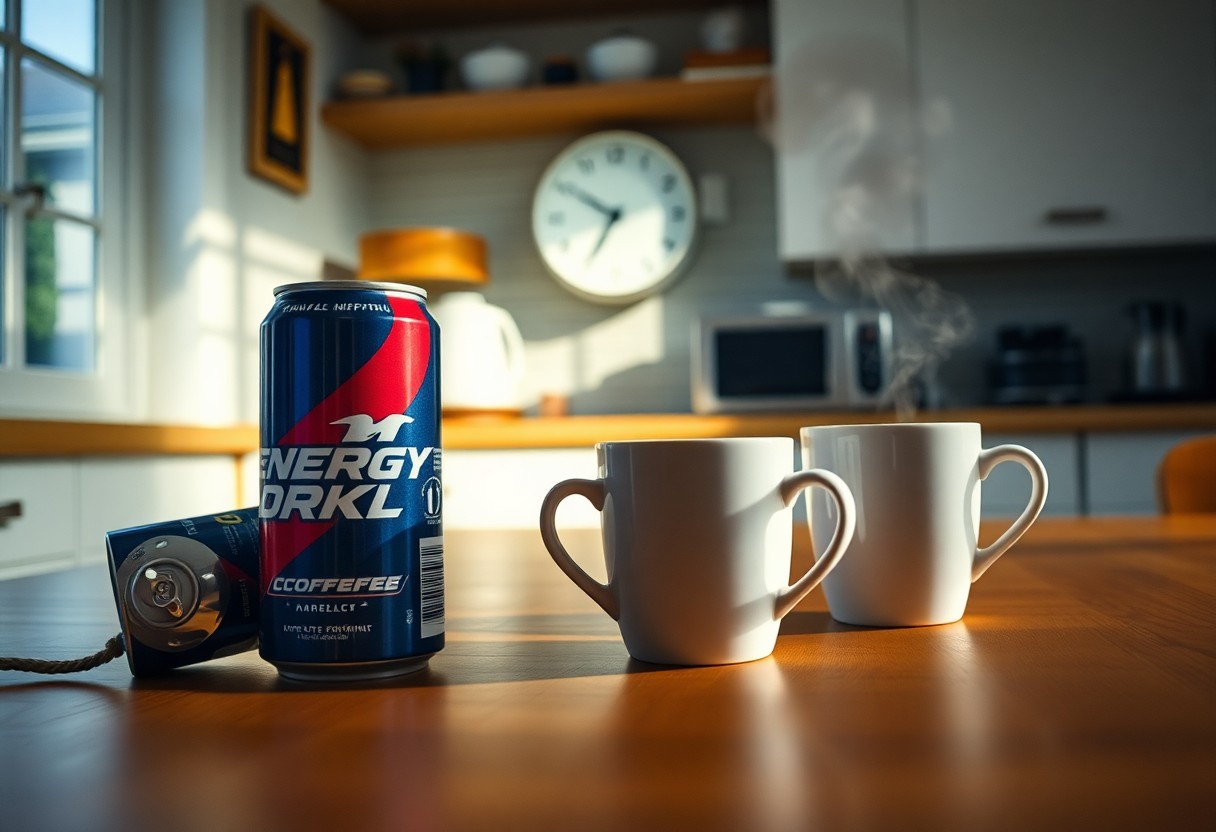Coffee can be a healthier alternative to energy drinks, offering you a more balanced source of caffeine along with various health benefits. While energy drinks often contain high sugar levels and artificial ingredients that can lead to dependency, switching to coffee can help you maintain your energy without experiencing severe withdrawal symptoms. In this post, you’ll learn effective strategies to make the transition smoother, allowing you to enjoy your daily caffeine boost without the jitters or crashes associated with energy drinks.

Key Takeaways:
- Gradually reduce energy drink consumption to minimize withdrawal symptoms when transitioning to coffee.
- Stay hydrated and focus on maintaining a balanced diet to support energy levels during the switch.
- Experiment with different types of coffee and brewing methods to find a preference that satisfies your caffeine needs.
The Science of Caffeine: Comparing Energy Drinks and Coffee
| Aspect | Energy Drinks vs. Coffee |
|---|---|
| Caffeine Content | Energy drinks typically contain 80-200 mg of caffeine per serving, while coffee averages around 95 mg per 8-ounce cup. |
| Sugar Levels | Energy drinks often contain high levels of sugar (up to 54 grams), unlike coffee, which can be consumed without sugar. |
| Other Ingredients | Energy drinks may include B vitamins, taurine, and ginseng, while coffee is primarily composed of caffeine and antioxidants. |
Chemical Composition and Stimulant Effects
Energy drinks and coffee both rely on caffeine for their stimulating effects, but their chemical compositions differ significantly. Energy drinks often combine caffeine with other stimulants, such as taurine and guarana, which can amplify its effects. This combination may lead to heightened alertness but also increases the risk of side effects like jitters and anxiety. In contrast, coffee provides a more balanced stimulant profile, primarily delivering caffeine along with natural antioxidants.
The Role of Sugar and Additional Ingredients in Energy Drinks
Sugar is a prominent feature in energy drinks, often contributing to the high calorie count and potential crash you may experience post-consumption. Many energy drinks contain up to 54 grams of sugar, leading to spikes in blood sugar that can result in a sudden burnout. In contrast, plain coffee can easily be enjoyed black, eliminating sugar-induced fluctuations and promoting steady energy levels.
Many energy drinks also boast additional ingredients that claim to enhance their energizing effects. Ingredients like B vitamins, amino acids, and herbal extracts are commonly included, with mixed efficacy in terms of benefits. While some of these components may provide marginal improvements in focus or endurance, they can sometimes lead to uncomfortable side effects, primarily when combined with high sugar levels. As you transition from energy drinks to coffee, opting for the simplicity of coffee can not only reduce unnecessary additives but also result in more stable and sustainable energy levels throughout your day.

Identifying Withdrawal Symptoms: What to Expect
Understanding withdrawal symptoms is important when switching from energy drinks to coffee. Your body may react as it adjusts to the decrease in caffeine and other stimulants. You might experience a mix of physical and psychological effects as these symptoms manifest, varying in intensity and duration depending on your previous energy drink consumption.
Common Withdrawal Symptoms When Switching
As you make the switch, you may encounter headaches, fatigue, irritability, and difficulty concentrating. These symptoms arise from your body craving the high levels of caffeine and sugar it’s used to. You might also feel more lethargic, and your mood could take a hit as hormonal shifts occur during this transition.
Duration and Intensity of Symptoms
Withdrawal symptoms can vary widely in duration and intensity. Most people report symptoms peaking within 1 to 3 days after cutting back, typically subsiding within a week. However, some individuals might experience lingering effects for longer, experiencing fluctuations as their body adapts to lower caffeine levels.
On average, you can expect symptoms to last from a few days up to two weeks, with the most challenging phase often occurring within the initial three days. If you switch gradually and stay attentive to your body’s signals, you can mitigate the intensity, making the process smoother. Staying hydrated and consuming a balanced diet plays a vital role in easing these temporary effects and assisting your body’s transition to coffee as your new caffeine source.
Crafting Your Transition Strategy: A Step-by-Step Guide
| Step | Action |
| 1 | Identify your daily energy drink intake. |
| 2 | Gradually reduce consumption over one to two weeks. |
| 3 | Introduce coffee as your primary caffeine source. |
| 4 | Experiment with different types of coffee and brewing methods. |
| 5 | Monitor your body’s response to the change. |
Gradual Reduction of Energy Drinks
Slowly cutting back on energy drinks can help your body adapt without harsh withdrawal symptoms. Start by reducing your intake by one can or bottle every few days, allowing your body to adjust to lower caffeine levels. This approach not only minimizes the risk of headaches or fatigue but also eases the shift in energy sources. For example, if you typically consume three energy drinks a day, try reducing to two for a week before moving to one.
Introduction to Coffee: Choosing the Right Type and Brew
Selecting the right coffee involves both the type of bean and the brewing method. You can choose from several coffee types, including Arabica, known for its mild flavor, or Robusta, which has a stronger taste and more caffeine. In terms of brewing, methods range from traditional drip coffee makers to espresso machines and pour-overs. Each method extracts flavors differently, so experimenting with various types can help you find what resonates with your palate the most.
Arabica beans are often regarded as the best choice for beginners due to their smoother, less bitter flavor profile. A French press or pour-over might enhance the coffee’s natural sweetness and aroma, making your transition enjoyable. If you crave bolder flavors, opt for a dark roast or consider trying a cold brew, which is less acidic and has a distinct taste. Trying different styles of coffee allows you to explore various flavor notes and strengths, adjusting to your preferences and ensuring a satisfying switch from energy drinks.
Maximizing Coffee’s Benefits: Strategies for Optimal Consumption
To gain the most from your coffee experience, consider your consumption patterns. This involves selecting the right beans, brewing methods, and, most importantly, the timing of your intake. By strategically aligning your coffee habits with your daily routine, your body can reap the benefits of caffeine without experiencing the jitters or crashes often associated with energy drinks.
Timing Your Coffee Intake for Best Results
Optimizing your coffee consumption relies heavily on timing. Having coffee shortly after waking can enhance your alertness, especially if it coincides with your body’s natural cortisol peak, generally around 8-9 AM. Avoiding coffee too late in the afternoon ensures a peaceful night’s sleep, allowing you to wake refreshed and ready for another productive day.
Exploring Alternative Sources of Energy
Incorporating alternative sources of energy into your routine can balance your coffee intake. Fresh fruits, nuts, and yogurt provide crucial nutrients and energy boosts without the crash. Herbal teas, green smoothies, or even a short walk can invigorate you without relying solely on caffeine, making for a well-rounded approach to your daily energy needs.
Switching gears from coffee to other energy sources can be a game changer. For example, bananas offer a quick burst of energy due to their natural sugars and carbohydrates, while almonds supply protein and healthy fats to fuel you throughout the day. Similarly, green smoothies enriched with spinach and fruits not only hydrate but also provide lasting energy through their fiber content. Diversifying your energy sources can lead to enhanced focus and stamina, ultimately making your coffee consumption more beneficial and less necessary.
Personal Stories: Success and Challenges in the Transition
Transitioning from energy drinks to coffee involves a mix of success stories and challenges. Many people report feeling significantly better after making the switch; they enjoy improved focus and a more stable energy level throughout the day. However, some have struggled with mild withdrawal symptoms, which can manifest as headaches and fatigue. It’s common to have an adjustment period where you experiment with different brewing methods and find the flavors that suit you best. You learn to navigate your new caffeine source, finding comfort in both the ritual and the benefits of a good cup of coffee.
Real Experiences from Former Energy Drink Consumers
Those who have transitioned from energy drinks share diverse experiences. One individual noted a serendipitous discovery of enjoying the flavors of various coffee roasts, which replaced the overwhelming sweetness of energy drinks. They described feeling more vibrant and having steadier energy levels, free from the crashing effects synonymous with energy drink consumption. Another person highlighted their initial struggle with caffeine withdrawal symptoms, yet they found relief in herbal teas during the transition and eventually embraced the earthy notes of their newly preferred brews.
Adapting Lifestyle Changes for Sustainable Energy
Sustaining your energy after switching to coffee requires modifying your overall lifestyle. Incorporating balanced meals, hydration, and exercise cultivates a foundational energy level that coffee can complement rather than dominate. You might start by evaluating your diet to include more whole foods, ensuring you obtain vital nutrients without the spikes and crashes energy drinks often cause. Regular sleep patterns also play a vital role in maintaining optimal energy throughout the day. Pairing these practices with your coffee routine enhances the balance, allowing you to enjoy the benefits of caffeine without dependence.
Developing a holistic approach to your daily routine can ensure that your newfound energy levels are sustainable over time. Start by setting a consistent sleep schedule that allows for at least seven hours of sleep, as adequate rest greatly influences your energy levels during the day. Additionally, establish a healthy meal routine with plenty of greens, lean proteins, and whole grains to provide your body with the vital nutrients it needs. Regular physical activity, even light exercises like walking, can drive up your energy levels naturally. By integrating these practices, you can enjoy coffee as a delightful complement to your healthy lifestyle rather than a crutch, leading to an enduring sense of vitality.
To wrap up
Upon reflecting, transitioning from energy drinks to coffee can be a smooth process if you approach it thoughtfully. By gradually reducing your energy drink intake while slowly introducing coffee, you can minimize any discomfort. Staying hydrated, incorporating healthy snacks, and being mindful of your caffeine limits will help maintain your energy levels and focus. Embrace the rich flavors and potential health benefits of coffee as you make this switch, ensuring a more sustainable choice for your daily caffeine intake.
FAQ
Q: What are the benefits of switching from energy drinks to coffee?
A: Switching from energy drinks to coffee can provide several benefits, including a more stable energy boost. Coffee contains antioxidants and can improve mental clarity and focus without the excessive sugar and additives often found in energy drinks. Additionally, coffee has been shown to enhance physical performance, making it a better choice for those looking to maintain energy levels throughout the day.
Q: How can I avoid withdrawal symptoms when switching to coffee?
A: To minimize withdrawal symptoms, it’s recommended to gradually reduce your consumption of energy drinks while simultaneously incorporating coffee into your routine. Start by replacing one energy drink with a cup of coffee daily, and slowly increase the coffee intake while decreasing energy drink consumption. Staying hydrated and maintaining a balanced diet can also support this transition.
Q: Will I get the same level of caffeine from coffee as I do from energy drinks?
A: Yes, coffee can provide a similar or even higher level of caffeine compared to many energy drinks. An 8-ounce cup of brewed coffee generally contains 80-100 mg of caffeine, while an energy drink can contain anywhere from 80 mg to over 300 mg. However, coffee is often consumed in moderation, allowing you to better control your caffeine intake and avoid excessive consumption that can lead to jitters or crashes.
Q: What types of coffee are best to start with?
A: When transitioning to coffee, starting with a type that suits your taste preferences is important. Light to medium roasts are usually smoother and less bitter, making them a good choice for beginners. You can also try adding milk, almond milk, or a bit of sweetener to ease into the taste. Experimenting with different brewing methods, such as drip, pour-over, or cold brew, can also enhance your experience.
Q: How long does it take to adjust from energy drinks to coffee?
A: The adjustment period can vary for everyone, but many find that it takes about a week to two weeks to fully transition from energy drinks to coffee without withdrawal symptoms. This timeframe allows your body to adapt to the change in caffeine source and to stabilize your energy levels. During this period, listening to your body and adjusting your caffeine intake as needed is beneficial.
